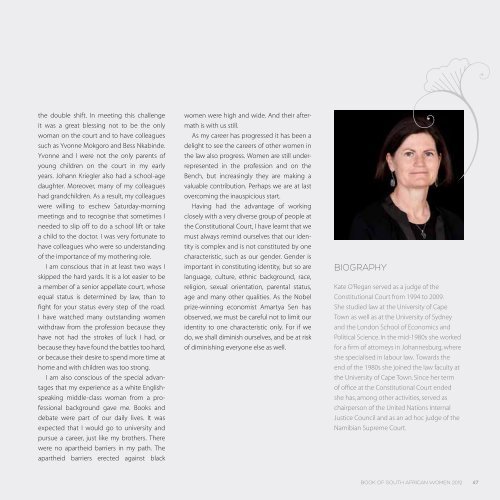Book of South African - Book of Women - Mail & Guardian
Book of South African - Book of Women - Mail & Guardian
Book of South African - Book of Women - Mail & Guardian
Create successful ePaper yourself
Turn your PDF publications into a flip-book with our unique Google optimized e-Paper software.
the double shift. In meeting this challenge<br />
it was a great blessing not to be the only<br />
woman on the court and to have colleagues<br />
such as Yvonne Mokgoro and Bess Nkabinde.<br />
Yvonne and I were not the only parents <strong>of</strong><br />
young children on the court in my early<br />
years. Johann Kriegler also had a school-age<br />
daughter. Moreover, many <strong>of</strong> my colleagues<br />
had grandchildren. As a result, my colleagues<br />
were willing to eschew Saturday-morning<br />
meetings and to recognise that sometimes I<br />
needed to slip <strong>of</strong>f to do a school lift or take<br />
a child to the doctor. I was very fortunate to<br />
have colleagues who were so understanding<br />
<strong>of</strong> the importance <strong>of</strong> my mothering role.<br />
I am conscious that in at least two ways I<br />
skipped the hard yards. It is a lot easier to be<br />
a member <strong>of</strong> a senior appellate court, whose<br />
equal status is determined by law, than to<br />
fight for your status every step <strong>of</strong> the road.<br />
I have watched many outstanding women<br />
withdraw from the pr<strong>of</strong>ession because they<br />
have not had the strokes <strong>of</strong> luck I had, or<br />
because they have found the battles too hard,<br />
or because their desire to spend more time at<br />
home and with children was too strong.<br />
I am also conscious <strong>of</strong> the special advantages<br />
that my experience as a white Englishspeaking<br />
middle-class woman from a pr<strong>of</strong>essional<br />
background gave me. <strong>Book</strong>s and<br />
debate were part <strong>of</strong> our daily lives. It was<br />
expected that I would go to university and<br />
pursue a career, just like my brothers. There<br />
were no apartheid barriers in my path. The<br />
apartheid barriers erected against black<br />
women were high and wide. And their aftermath<br />
is with us still.<br />
As my career has progressed it has been a<br />
delight to see the careers <strong>of</strong> other women in<br />
the law also progress. <strong>Women</strong> are still underrepresented<br />
in the pr<strong>of</strong>ession and on the<br />
Bench, but increasingly they are making a<br />
valuable contribution. Perhaps we are at last<br />
overcoming the inauspicious start.<br />
Having had the advantage <strong>of</strong> working<br />
closely with a very diverse group <strong>of</strong> people at<br />
the Constitutional Court, I have learnt that we<br />
must always remind ourselves that our identity<br />
is complex and is not constituted by one<br />
characteristic, such as our gender. Gender is<br />
important in constituting identity, but so are<br />
language, culture, ethnic background, race,<br />
religion, sexual orientation, parental status,<br />
age and many other qualities. As the Nobel<br />
prize-winning economist Amartya Sen has<br />
observed, we must be careful not to limit our<br />
identity to one characteristic only. For if we<br />
do, we shall diminish ourselves, and be at risk<br />
<strong>of</strong> diminishing everyone else as well.<br />
BIogrAPhY<br />
Kate O’Regan served as a judge <strong>of</strong> the<br />
Constitutional Court from 1994 to 2009.<br />
She studied law at the University <strong>of</strong> Cape<br />
Town as well as at the University <strong>of</strong> Sydney<br />
and the London School <strong>of</strong> Economics and<br />
Political Science. In the mid-1980s she worked<br />
for a firm <strong>of</strong> attorneys in Johannesburg, where<br />
she specialised in labour law. Towards the<br />
end <strong>of</strong> the 1980s she joined the law faculty at<br />
the University <strong>of</strong> Cape Town. Since her term<br />
<strong>of</strong> <strong>of</strong>fice at the Constitutional Court ended<br />
she has, among other activities, served as<br />
chairperson <strong>of</strong> the United Nations Internal<br />
Justice Council and as an ad hoc judge <strong>of</strong> the<br />
Namibian Supreme Court.<br />
<strong>Book</strong> <strong>of</strong> <strong>South</strong> AfrICAn women 2012 47


